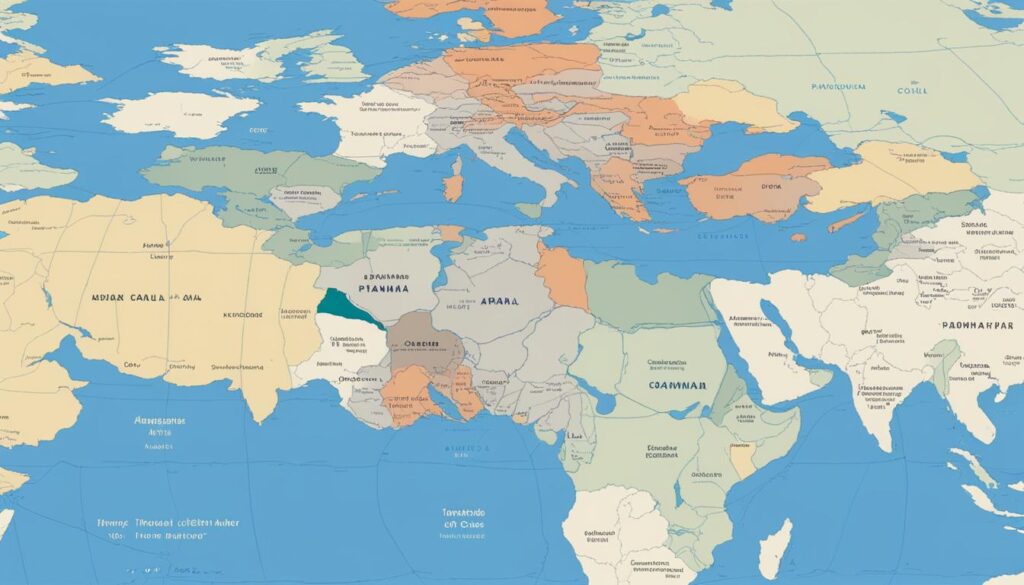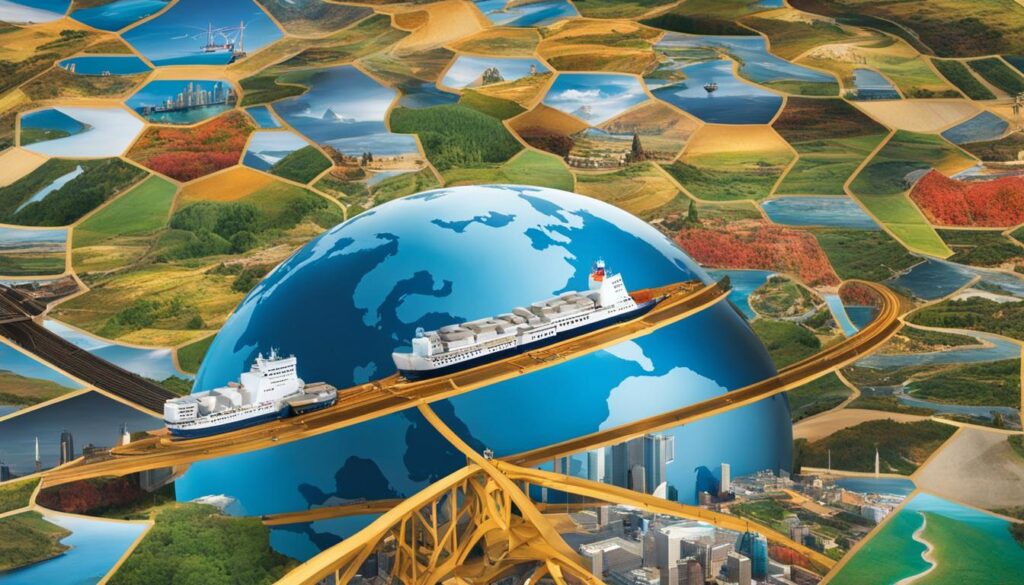Peter Zeihan, a renowned geopolitical analyst and global strategist, offers valuable insights into international relations, world affairs, and global trends. With his deep understanding of the political landscape and global economy, Zeihan provides strategic analysis to help businesses and leaders navigate the complexities of international politics.
Zeihan’s expertise has garnered recognition from prestigious publications like The Wall Street Journal, Forbes, CNN, and The New York Times. His latest work challenges assumptions about how the world works and provides a fresh perspective on the geopolitical trends shaping our global landscape.
Key Takeaways:
- Peter Zeihan is a leading geopolitical analyst and global strategist.
- His expertise covers international relations, world affairs, and global trends.
- Zeihan’s strategic analysis helps businesses and leaders navigate the complex political landscape.
- His insights have been featured in top publications and broadcasts.
- Zeihan challenges assumptions about how the world works and offers a fresh perspective.
The Influence of Geopolitics on Global Trade
In his analysis of geopolitics, Peter Zeihan delves into the profound impact it has on global trade. One aspect he emphasizes is the transformation of transportation costs. Historically, transportation accounted for a significant percentage of the cost of goods. However, advancements in technology and infrastructure have led to a significant decrease in transportation costs, revolutionizing trade dynamics. This decrease in costs has enabled businesses to access global markets more easily and has facilitated the growth of international trade.
Zeihan also explores the security paradigm of globalization, focusing on the role of the United States. He highlights the diminishing capacity of naval forces and the rise of supercarriers, which has altered the comprehensive global coverage necessary for sustained globalization. This shift in the security landscape has far-reaching implications for global trade, as it affects the ability to secure shipping lanes and ensure the smooth flow of goods.
“The diminishing capacity of naval forces and the rise of supercarriers impact the comprehensive global coverage necessary for sustained globalization.”
Understanding the complex relationship between geopolitics and global trade is crucial for businesses and industries reliant on international markets. As geopolitical tensions continue to shape the world, it is essential to adapt to the evolving landscape and anticipate potential disruptions in trade flows. By staying informed and analyzing the geopolitical factors influencing global trade, businesses can make more informed decisions and mitigate risks.
Geopolitical Events and Trade Disruptions
Geopolitical events, such as conflicts, trade wars, and international disputes, have a significant impact on global trade. These events can disrupt supply chains, lead to trade barriers, and increase economic uncertainties. Understanding the geopolitical landscape and anticipating potential disruptions is vital for businesses to minimize risks and maintain a competitive edge.
| Geopolitical Event | Impact on Global Trade |
|---|---|
| Trade War between China and the United States | Imposition of tariffs, trade barriers, and uncertainty in global supply chains. |
| Regional Conflicts | Disruption of transportation routes, closure of ports, and increased security risks. |
| Political Instability in Oil-Producing Countries | Decreased oil production, volatility in energy prices, and supply chain disruptions. |
By closely monitoring geopolitical events and their potential impact on global trade, businesses can proactively adjust their strategies, diversify their supply chains, and mitigate risks. The ability to navigate complex geopolitical landscapes is becoming increasingly crucial in a globally interconnected world.

The Changing Landscape of Globalization

In today’s rapidly evolving world, the concept of globalization is undergoing significant transformations. Peter Zeihan, a renowned geopolitical analyst, challenges long-held assumptions about the future of globalization and its impact on the global economy. As the United States shifts its commitment to securing shipping lanes with hard assets, questions arise about the potential effects on the expense and calculus of global shipping. However, this idea may lack a strong basis in reality.
Insurance companies continue to ensure voyages without significant changes in costs, demonstrating their ability to mitigate risks associated with securing global trade routes. Additionally, it’s important to consider that the United States is not the sole power capable of safeguarding shipping lanes. Nations like France and the U.K., with their capable navies, also contribute to maintaining the security of international trade.
The COVID-19 pandemic and geopolitical issues, such as tensions with China and the War in Ukraine, have further disrupted global supply chains, leading to a reevaluation of globalization. Companies are reshoring and “friend-shoring” production to balance shorter supply chains and labor costs. While these developments introduce challenges, they also create opportunities for nations to reassess their priorities and fortify their strengths in an ever-changing geopolitical landscape.
Table: Comparison of Naval Powers
| United States | China | Russia | Iran | |
|---|---|---|---|---|
| Navy Strength | Superior | Growing | Strong | Developing |
| Global Influence | Extensive | Expanding | Regional | Localized |
| Capability to Secure Shipping Lanes | Highly capable | Potential challenge | Dependent on resources | Restricted |
This table provides a brief comparison of naval powers, highlighting their respective strengths and capabilities in securing shipping lanes. The United States maintains a superior navy with extensive global influence, making it highly capable of safeguarding international trade routes. China’s navy is growing and expanding its global influence, potentially posing a challenge to the U.S. Russia possesses a strong regional navy, while Iran’s navy remains more localized in nature.
The Future of Global Trade and Geopolitics
Peter Zeihan’s analysis of geopolitics and global trade provides valuable insights into the future landscape of international relations and the global economy. As globalization faces new challenges and undergoes transformations, it is essential to understand how these changes will shape the future. Zeihan argues that the erosion of traditional globalization opens up opportunities for nations to reassess their priorities and fortify their strengths.
While Zeihan’s perspective acknowledges the shifting paradigm of global economic growth and security, it may overlook the potential impact of geopolitical events and violent conflicts. The intricate interplay between global trade and geopolitics necessitates a comprehensive understanding of the risks and opportunities that arise from geopolitical turmoil. As nations navigate through these complexities, the balance between the globalized economy and localized interests will become increasingly significant.
Zeihan’s insight: “The world is entering a new era where the global economic order is undergoing fundamental shifts. Geopolitical events and the potential for violent conflict can disrupt supply chains and reshape global trade dynamics. It is crucial for businesses and leaders to stay informed and adapt to these changes.”
One of the key considerations for the future of global trade lies in the resilience of supply chains. The pandemic and geopolitical tensions have exposed vulnerabilities in the existing global supply chain networks, prompting companies to reevaluate their strategies. The concept of reshoring and “friend-shoring,” where production is brought closer to home or strategically aligned with reliable partners, emerges as a response to mitigate risks and optimize efficiency.
To provide a comprehensive analysis of the future of global trade and geopolitics, a table highlighting the potential impact of geopolitical events on the globalized economy can aid in understanding the complexities and interdependencies involved. The table below illustrates different scenarios and their potential consequences:
| Geopolitical Event | Potential Impact on Globalized Economy |
|---|---|
| Trade wars and protectionism | Disruption of supply chains and increased tariffs leading to higher costs for businesses and consumers |
| Terrorist attacks | Heightened security measures and potential disruptions to transportation and trade routes |
| Cyberattacks | Increased vulnerability of digital infrastructure and potential disruptions to global trade and financial systems |
| Regional conflicts | Displacement of populations, disruptions to trade routes, and potential escalation of violence |
By considering the potential consequences of geopolitical events, businesses and leaders can develop robust strategies that account for uncertainties and maximize opportunities. Peter Zeihan’s insights are invaluable in navigating the evolving landscape of global trade and geopolitics, providing a lens through which to anticipate and adapt to future challenges and opportunities.
By understanding the complex relationship between global trade and geopolitics, businesses and leaders can proactively navigate the evolving landscape of the globalized economy. Peter Zeihan’s expertise offers valuable insights into the future of global trade, providing a roadmap for informed decision-making in an increasingly interconnected and uncertain world.

Conclusion
As we conclude this exploration of geopolitics and its impact on global trade, it is clear that Peter Zeihan’s insights provide a unique perspective on the ever-changing geopolitical landscape. While his predictions may be controversial and debated, they offer valuable food for thought in navigating the complexities of our global economy and political sphere.
Looking ahead, the future of globalization and global trade remains uncertain. With a growing emphasis on localized interests and shorter supply chains, the traditional model of unrestricted global trade is shifting. This shift presents both challenges and opportunities for nations worldwide.
It is crucial to stay informed and adapt to the geopolitical trends that shape our world. Peter Zeihan’s expertise allows us to gain a comprehensive understanding of the changing geopolitical landscape. By doing so, we can better equip ourselves to make informed decisions in the face of uncertainty.
FAQ
Who is Peter Zeihan?
Peter Zeihan is a geopolitical analyst and global strategist who specializes in international relations and world affairs. He provides insights into global trends and the political landscape, offering strategic analysis for businesses and leaders.
What is the influence of geopolitics on global trade?
Geopolitics plays a significant role in shaping global trade. Peter Zeihan highlights the transformation of transportation costs, the security paradigm of globalization, and the impact of supercarriers on trade dynamics.
How is the landscape of globalization changing?
Peter Zeihan challenges assumptions about the commitment of the United States to secure shipping lanes with hard assets. However, insurance companies continue to ensure voyages without significant cost changes, and other naval powers like France and the U.K. can also secure shipping lanes. Geopolitical events, such as tensions with China and the War in Ukraine, have disrupted global supply chains and led to the reevaluation of globalization.
What does the future hold for global trade and geopolitics?
The future of global trade and geopolitics is uncertain. While Peter Zeihan argues that the global economic growth-security paradigm is shifting away from traditional globalization, other factors like geopolitical events and potential violent conflicts arising from pandemics should also be considered. The globalized economy is likely to endure, but with a more balanced approach to supply chains and localized interests.

